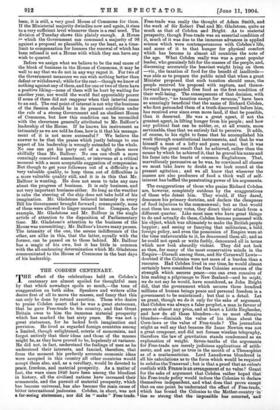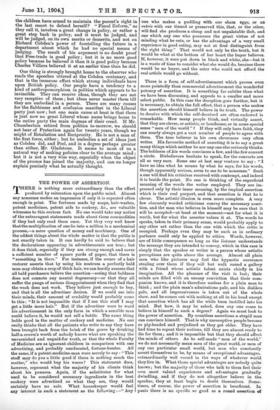centenary are almost spoiled for thoughtful men by that which
nowadays spoils so much,—the tone of exaggeration on both sides. Speakers and writers alike desire first of all to move the masses, and fancy that this can only be done by rotund assertion. Those who desire to praise Cobden assert that he was a great statesman, that he gave Free-trade to his country, and that Great Britain owes to him the immense material prosperity which has marked the last sixty years. He was not a great statesman, for he lacked both imagination and prevision. He lived as regarded foreign countries among a limited, though enlightened, coterie of economists, and forgot entirely that their ideas and those of the masses might be, as they have proved to be, hopelessly at variance. He did not, in fact, understand the feelings of men as he understood their interests, and fancied, therefore, that from the moment his perfectly accurate economic ideas were accepted in this country all other countries would accept them also, and, as a corollary, would be devoted to peace, freedom, and material prosperity. As a matter of fact, the wars since 1846 have been among the bloodiest in history, all the civilised nations have increased their armaments, and the pursuit of material prosperity, which has become universal, has also become the main cause of bitter international jealousies. Cobden, in short, was not a far-seeing statesman; nor did he "make" Free-trade. Free-trade was really the thought of Adam Smith, and the work of Sir Robert Peel and Mr. Gladstone, quite as much as that of Cobden and Bright. As to material prosperity, though Free-trade was an essential condition of it, much of it was due to the immense advances in applied science which were contemporaneous with Cobden's life, and some of it to that hunger for physical comfort which has become in almost all countries the note of the age. What Cobden really was was a great popular leader, who genuinely felt for the masses of the people, and, discerning accurately the heaviest weight lying on them —viz., the taxation of food for the benefit of landlords— was able so to prepare the public mind that when a great Minister proposed that such taxation should cease, the people received his proposal with rapture, and thence- forward have regarded free food as the first condition of their well-being. The consequences of that decision, with its corollary, "no taxation except for revenue," have been so amazingly beneficial that the name of Richard Cobden, who first persuaded them of a truth discovered before him, has received ever since even more laud, if that be possible, than it deserved. He was a great agent, if not the greatest agent, in lifting hunger from his people ; and how any political feat can be nobler, or, at all events, more serviceable, than that we entirely fail to perceive. It adds, of course, to his right to fame that he accomplished his work through constitutional instruments, and that he was himself a man of a lofty and pure nature ; but it was through the great result that he achieved, rather than the means by which he achieved it, that he graved his name and his fame into the hearts of common Englishmen. That, marvellously persuasive as he was, he convinced all classes we must take leave to doubt as we look round at the present agitation ; and we all know that wherever the masses are also producers of food a thick wall of self- interest has baffled the penetrating power of his arguments.
The exaggerations of those who praise Richard Cobden are, however, completely outdone by the exaggerations of those who detest him. They would, if they dared, denounce his primary doctrine, and declare the cheapness of food injurious to the commonweal ; but as that would cost them too many votes, they direct their attack from a different quarter. Like most men who have great things to do and actually do them, Cobden became possessed with his object, which was ultimately to make the British people happier ; and seeing or fancying that militarism, a bold foreign policy, and even the possession of Empire were at the time unfavourable to it, he denounced them all; and as he could not speak or write feebly, denounced all in terms which now look absurdly violent. They did not look so then, for many of the most conservative minds in the Empire—Disraeli among them, and Sir Cornewall Lewis— doubted if the Colonies were not more of a burden than a resource. Had Cobden lived in our time, he would almost certainly have considered the free Colonies sources of the strength which secures peace—one can even conceive of him making a pilgrimage to New Zealand—and he might, we do not say he would, have considered, as John Bright did, that the government which secures three hundred millions of human beings peace and personal freedom is a government to be maintained • but that is a detail. Let us grant, though we do it only for the sake of argument, that Cobden was always a false prophet, a man in favour of peace at almost any price, and at heart a Little Englander, and how do all those blunders—to us most offensive blunders—diminish the value of his ideas about the Corn-laws or the value of Free-trade ? The journalists might as well say that because Sir Isaac Newton was not a great composer, and did not foresee wireless telegraphy, therefore the law of gravitation stands condemned as an explanation of weight. Seven-tenths of the arguments for Free-trade are merely judicious applications of arith- metic, and are just as true in the mouth of a Theosophist as of a mathematician. Lord Lansdowne blundered in all his calculations as to the force which would be required to subdue the Transvaal ; but is that a proof that an entente cordiale with France is an arrangement of no value? Grant for the sake of argument that Cobden rather hoped that• his Free-trade policy would induce the Colonies to declare themselves independent, and what does that prove except that on one point he underrated the effect of Free-trade,' which has bound the Colonies to the Mother-country- in' ties so strong that the impossible has occurred, and
the children have armed to maintain the parent's right in the last resort to defend herself? "Fiscal Reform," as they call it, involves a great change in policy, or rather a great step back in policy, and it must be judged, and will be judged, on its own merits or demerits, and not on Richard Cobden's power of foretelling the future in a department about which he had no special means of judging. The result of his argument is no doubt proof that Free-trade is good policy; but it is no more good policy because he believed it than it is good policy because Charles Villiers believed it at an earlier time than he did.
One thing is strongly brought home to the observer who reads the speeches uttered at the Cobden centenary, and that is the immense effect which strong individuals have upon British policy. Our people have a tendency to a kind of anthropomorphism in politics which appears to be invincible. They can receive ideas, though they are not very receptive of them ; but ideas never master them till they are embodied in a person. There are many causes for the flabbiness and confusion manifest in the Liberal party just now ; but one main cause at least is that there is just now no great Liberal whose name brings home to the entire party the main dogmas of their creed. If Mr. Chamberlain retired from politics to-morrow, we should not hear of Protection again for twenty years, though we might of Retaliation and Reciprocity. He is not a man of the first force, either ; but he embodies a set of ideas just as Cobden did, and Peel, and in a degree perhaps greater than either, Mr. Gladstone. It seems to most of us a natural way of making policies clear to the average mind ; but it is not a very wise way, especially when the object of the process has joined the majority, and can no longer explain precisely what he actually thought.











































 Previous page
Previous page